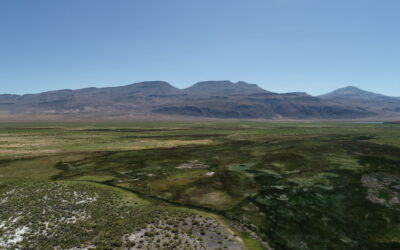Reno, NV (April 7, 2020): The Desert Research Institute (DRI) proudly announced today that Dr. Naresh Kumar has been selected to lead the Institute’s Division of Atmospheric Sciences.
 Dr. Kumar comes to DRI from the Electric Power Research Institute (EPRI) in Palo Alto, California, where he served for more than 20 years as a senior program manager and environmental leader in the areas of air quality, climate change, renewable energy, and multimedia sciences.
Dr. Kumar comes to DRI from the Electric Power Research Institute (EPRI) in Palo Alto, California, where he served for more than 20 years as a senior program manager and environmental leader in the areas of air quality, climate change, renewable energy, and multimedia sciences.
“I am extremely pleased to join DRI and honored to lead its Division of Atmospheric Sciences,” said Dr. Kumar. “DRI has an excellent reputation for conducting the highest quality of science for the betterment of society, and I am committed to maintaining that excellence while expanding research and solutions to solve emerging environmental challenges.”
While at EPRI, Dr. Kumar oversaw a diverse research portfolio, while inspiring teams of scientists and the development of multi-disciplinary programs and international collaborations. His technical leadership and success fostering key relationships helped EPRI significantly grow and expand its program offerings in air quality and health, climate change, and environmental aspects of renewables research beyond market expectations.
“Dr. Kumar brings an impressive record of accomplishments to DRI,” said Dr. Kumud Acharya, Interim President of DRI. “He has a depth of experience and relationships across a broad network of national and international scientific experts in top academic institutes, as well as our national labs, many federal and state agencies, private industry, and well-known environmental groups.”
Dr. Kumar has a Ph.D. in Mechanical Engineering from Carnegie Mellon University, an MBA from the Walter Haas School of Business at UC Berkeley, an M.S. in Mechanical Engineering from UC Santa Barbara, and a B.Tech. in Mechanical Engineering from the Indian Institute of Technology, Kharagpur, India.
For more information about the DRI Foundation or DRI please visit www.dri.edu
###
The Desert Research Institute (DRI) is a recognized world leader in basic and applied interdisciplinary research. Committed to scientific excellence and integrity, DRI faculty, students, and staff have developed scientific knowledge and innovative technologies in research projects around the globe. Since 1959, DRI’s research has advanced scientific knowledge, supported Nevada’s diversifying economy, provided science-based educational opportunities, and informed policy makers, business leaders, and community members. With campuses in Reno and Las Vegas, DRI serves as the non-profit research arm of the Nevada System of Higher Education.


